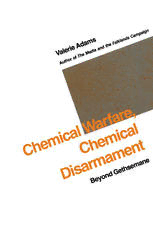
Chemical Warfare, Chemical Disarmament: Beyond Gethsemane PDF
Preview Chemical Warfare, Chemical Disarmament: Beyond Gethsemane
CHEMICAL WARFARE, CHEMICAL DISARMAMENT: BEYOND GETHSEMANE Also by Valerie Adams TilE FALKLANDS CONFLICT *TilE MEDIA AND TilE FALKLANDS CAMPAIGN • Also published by Palg rave Macmillan Chemical Warfare, Chemical Disarmament: Beyond Gethsemane Valerie Adams M MACMILLAN © Valerie Adams 1989 Softcover reprint of the hardcover 1st edition 1989 All rights reserved. No reproduction, copy or transmission of this publication may be made without written permission. No paragraph of this publication may be reproduced, copied or transmitted save with written permission or in accordance with the provisions of the Copyright Act 1956 (as amended), or under the terms of any licence permitting limited copying issued by the Copyright Licensing Agency, 33-34 Alfred Place, London WC1E 7DP. Any person who does any unauthorised act in relation to this publication may be liable to criminal prosecution and civil claims for damages. First published 1989 Published by THE MACMILLAN PRESS LTD Houndmills, Basingstoke, Hampshire RG21 2XS and London Companies and representatives throughout the world British Library Cataloguing in Publication Data Adams, Valerie, 1950-- Chemical warfare, chemical disarmament: Beyond Gethsemane. 1. Chemical Warfare, to 1988 I. Title 355'.0217 ISBN 978-1-349-08905-5 ISBN 978-1-349-08903-1 (eBook) DOI 10.1007/978-1-349-08903-1 The garden called Gethsemane In Picardy it was, And there the people came to see The English soldiers pass. We used to pass - we used to pass Or halt, as it might be, And ship our masks in case of gas Beyond Gethsemane 'Gethsemane 1914-18', Rudyard Kipling Contents List of Tables ix Introduction xi 1 'Trouble in the Wind' 1 2 'The Air a River of Opaque Filth' 25 3 'A Matter of Fashion Changing' 45 4 'A Green Country ... Knocked Silly by Guns' 71 5 'Still Falls the Rain' 91 6 'Quantity has a Quality of Its Own' 119 7 'An Armed and Agile Nation' 144 8 'And the Living Nations Wait' 167 9 'Will It Be So Again?' 198 Notes 223 Bibliography 256 Index 269 List of Tables 1.1 Main CW Agents 10 7.1 CW Programme Funding FY 81-83 in $m 154 Introduction This study arose out of my own sense of frustration as an official in the Ministry of Defence, working on chemical disarmament. Whether or not one agrees with it, the rationale for the possession of nuclear weapons is relatively straightforward; the issues raised by chemical warfare seemed more complex, often contradictory. The ground on which policy was being made shifted, depending on the imperative of the moment. That was nearly ten years ago, but nothing which has happened in the meantime has made the issues any less complex, or the subject of less importance. Chemical weapons are not at the forefront of defence policy-making; compared to nuclear or conventional weapons, they have a limited place in the strategy of deterrence. Nonetheless, developments over the past decade -growing concerns in NATO about the Soviet threat, allegations of use in Asia and the Middle East, progress towards banning them, and the modernisation of the US chemical arsenal-have all kept them in the public eye. The issues, and their resolution, have become more pressing. I am acutely conscious of the shortcomings of this study: compress ing the enormous amount of material available into a single volume has inevitably meant omitting interesting and relevant material-such as discussion of the US programme for chemical weapon destruction. Although I have not set a formal cut-off date, events after early 1988 are necessarily dealt with somewhat cursorily. I have tried to include historical and contemporary material which throws light on what seem to me to be the two main questions - how did we get into our current position, and where should we go from here? I do not claim to have any perfect answers: the most one can do is indicate that a certain direction is probably the best way forward. This book could not have been produced without the financial assistance of the Joseph Rowntree Charitable Trust, and I am most grateful to the trustees. Like all academics working in this field, I must acknowledge my debt to the numerous SIPRI publications on this subject, and to the author of many of them, Julian Perry Robinson, whose help has been generous and invaluable. I should like also to offer particular thanks for their encouragement and practical assistance to Lawrence Freedman and Dr John Walker, and xi xii Introduction to Dr Graham Pearson for permitting me to visit the Chemical Defence Establishment (CDE) at Parton Down. Many others have kindly shared their time and knowledge, among them Ian Andrews, Alan Bebbington, Brian Bond, John Bullock, Graden Carter, Marie Colvin, Charles Dick, Chris Donnelly, Elisa Harris, John Hemsley, Dr B. Jasani, Efraim Karsh, Margot Kirk, Jim Steinberg, David Summerhayes, Sandy Verschbow; the staffs of the libraries at the United Nations office in London, at the Royal United Services Institute, the US Embassy, and the British Newspaper Library at Colindale. I acknowledge also the assistance of the Liddell Hart Centre for Military Archives at King's College, London, and am grateful for their permission to quote from the Foulkes and Liddell Hart papers held there. My greatest debts are to my parents, Jim and Eileen Bell, for their unfailing enthusiasm and encouragement, and especially to my husband, Derek Adams, who read both text and proofs, offered constant support-and cooked the supper, night after night! For those interested in such things, the quotations in the chapter headings are taken from Rudyard Kipling (Tommy Atkins, Danegeld), Herbert Read (Beata l'Alma), Winston S. Churchill, Edmund Blunden (Report on Experience), Dame Edith Sitwell (Still Falls the Rain: The Raids 1940, Night and Dawn), I.V. Lenin (attrib.), W.H. Auden (In Memory ofW.B. Yeats), Cecil Day Lewis (Will it be so again?). Finally, I must make clear that the opinions expressed in this book are my own and do not reflect the official views of the Ministry of Defence.
